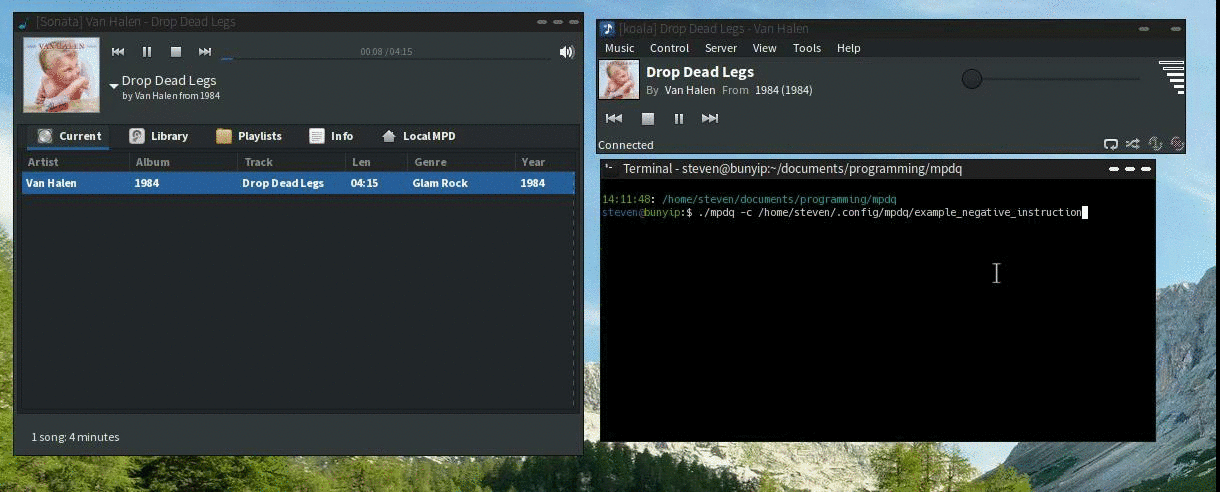Automatic MPD playlist or party mode creator to provide complexity and randomness while autoqueuing MPD without relying on external services.
mpdq is a auto-queing system for MPD to create a flexible and configurable
"party mode" effect with randomization and (re)discovery of your own music.
Inspired by the eclectic soundtracks of Letterkenny, High Fidelity,
Doom Patrol, and many more. (More explanation for why is at my blog.
mpdq will autoqueue random tracks from your existing music library, with
(very) configurable weighting by genre and simple defaults.
Because it uses mpd's own data, new tracks and changes to your music library
will be incorporated when mpd is updated.
If you are looking for the older, heaver, and BPM-using version of mpdq,
those files are in the bpm_version directory of this repository.
This project is licensed under the MIT License. For the full license, see LICENSE.
These are probably already installed or are easily available from your distro on linux-like distros:
- Create $HOME/.config/mpdq
- Place mpdq.ini in $HOME/.config/mpdq
This file (example provided) contains only the following lines:
musicdir=/directory/to/music
mpdserver=hostname.of.mpd
mpdport=6600
mpdpass=mpd_password
queuesize=10
hours=8
The last two manage the size of queue that mpdq maintains and how many hours
after playing a song that mpdq will not play it again. Defaults are:
$HOME/Music
localhost
6600
(no password)
10
8
The behavior of mpdq is governed by simple instruction files, as many (or
few) as you desire. The location of the instruction file does not matter, and
must be specified on the command line. Without an instruction file, mpdq will
just shuffle through your entire library with an equal weight to each genre.
Each instruction file is a series of lines in the format genre=weight like so:
Default=1
Rock=3
Classical=0
Rather than go through all the genres and subgenres of your music library and
explicitly defining each one, the Default line assigns a weight to all genres
not otherwise explictly named. Genres with higher number values will show up
more often. In the example above, all genres have a weight of "1" except for
Rock and Classical. Rock will show up more often, while Classical will not
appear at all with a value of "0".
This allows for both very eclectic selections (as with the example above) or very focused selections, such as with the example below:
Default=0
Industrial=1
Gothic=1
Capitalization Matters Here
mpdq can also create an example instruction file with all genres listed so
that you can check your genre names properly. It won't hurt to have all the
genres listed, but it is totally unneeded.
The instruction file should end in a newline. If it does not, mpdq will add
one automatically.
mpdq [-d #][-c /path/to/file][-khe]
mpdq has the following command line switches:
- -c : Which instruction file to use
- -d : Override the default priority in the instruction file
- -k : Kill a currently running
mpdqprocess. - -e : Create an example instruction file at $HOME/.config/mpdq/example_instruction.
- -h : Show a short help message.
mpdq will automatically pause if MPD is not set to:
- random: off
- repeat: off
- consume: on
So if you want to have "default" behavior back from MPD without interference
from mpdq, but want to leave the process running, just toggle any of those
values for MPD.
mpdq is meant to be run in the background. Because you define the hostname,
it does not have to be on the same machine running MPD.
mpdq logs what songs it has played, and will not repeat the same song during
the time specified in mpdq.ini.
If you wish to use mpdq as a systemd unit, this template works for me (obviously
change the home directory and user as appropriate, named mpdq.service:
[Unit]
Description=Start mpdq service
After=mpd.service
[Service]
Type=oneshot
RemainAfterExit=yes
User=steven
Group=steven
ExecStart=/home/steven/apps/mpdq/mpdq -c /home/steven/.config/mpdq/example_instruction_file
ExecStop=/home/steven/apps/mpdq/mpdq -k
WorkingDirectory=/home/steven
[Install]
WantedBy=multi-user.target
If mpdq is running for any length of time, there will be library changes. I
realized this after adding a bunch of standup albums with the new genre "Standup"
and suddenly had Steven Wright talking after "Love Will Tear Us Apart". To
fix this possible problem, you first have to set Default=0 in the
instruction file loaded by systemd. Then you have to have mpdq get restarted
whenever the MPD database changes. You can either use monit or fswatch to
make this happen.
If you have mpdq set up as a systemd unit, reloading it if there's a change
to the MPD database is pretty easy with this configuration (again, changing
path names as appropriate:
(The "every 2 cycles" is because of the delay as mpdq starts up.)
check process mpdq with pidfile /tmp/mpdq.pid
every 2 cycles
start program "/bin/systemctl start mpdq.service"
stop program "/bin/systemctl stop mpdq.service"
depends on mpd_db
check file mpd_db with path /home/steven/.mpd/tag_cache
if changed timestamp then restart
If you would rather use the fswatch
utility to achive the same end, have cron call this script at a regular interval:
/usr/local/bin/fswatch /home/steven/.mpd/tag_cache | sudo /bin/systemctl stop mpdq.service && sudo /bin/systemctl start mpdq.service
- start tagging and releases
- switch instruction file without ending process (perhaps part of the idle loop?)

